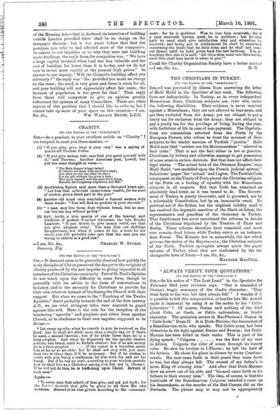THE CHRISTIANS IN TURKEY.
[To THE EDITOR OF THE "SPECTATO5.:9 Sut,—I was prevented by illness from answering the letter of Hall Halid in the Spectator of last week. The following facts are indisputable. In Turkey, as in every independent Mussulman State, Christian subjects are, inter a/la, under the following disabilities. Their evidence is never received against a Mussulman; they are not allowed to bear arms, and are thus excluded from the Army, yet are obliged to pay a heavy tax for exclusion from the Army; they are obliged to pay a yearly tax for the privilege of living during the year, with forfeiture of life in case of non-payment. The Capitula- tions are concessions extorted from the Porte by the European Powers, who refuse to trust the meanest of their subjects to the tender mercies of Turkish "justice." Hard Halid says that "neither are the Mahommedans " "allowed to bear arms." That is not the fact either in law or practice. Christians, by bribery and otherwise, manage to get possession of some arms in certain districts. But that does not affect their legal status. "The actual laws of the Ottoman Empire," says Hall! Halid, "are modelled upon the French judicial system." Substitute " paper" for "actual," and I agree. The Turkish Code consequent on the Treaty of Paris placed the Christian- subjects of the Porte on a footing of equality with the Mussulman subjects in all respects. But that Code has remained an absolutely dead letter, as it was bound to do. The Govern- ment of Turkey is purely theocratic, and is governed, not by a reformable Constitution, but by an immutable creed. No political act of the Sultan has the slightest validity until it has received the dogmatic sanction of the Sheik-al-Islam, the representative and guardian of the theocracy in Turkey. That functionary has never sanctioned the reforms in favour of the Christians stipulated by the Treaties of Paris and Berlin. Those reforms therefore have remained, and must ever remain, dead letters while Turkey exists as an indepen- dent Power. The Koranic law is, meanwhile, the law which governs the status of the Rayahs,--i.e., the Christian subjects of the Porte. Turkish apologists always quote the paper reforms of Turkey when they are confronted by the un- changeable laws of Islam.—I am, Sir, &c.,
MALCOLM MACCOLL.






































 Previous page
Previous page